Are your allergy symptoms flaring up in late summer and early fall? If so, ragweed…

Top Doctors 2018 – Dr. Manav Segal, MD
We are excited to announce that Philadelphia allergist, Dr. Manav Segal, MD has been named a Top Doctor for 2018 in Philadelphia Magazine.
Check out the Q & A with Dr. Manav Segal, MD or click here to visit the magazine page.
Q: You are one of only a few hundred doctors nationwide who treats severe food allergies with breakthrough oral immunotherapy treatment. How does it work?
A: Oral immunotherapy desensitizes patients to a food they are allergic to by slowly and systematically reintroducing the food starting with very low doses. Over a period of 12 to 15 months, doses are increased as the patient builds up a tolerance, which allows them to consume the food without having a life-threatening reaction. We’re seeing about an 85 percent success rate. It is really improving quality of life for adults and children with severe food allergies. They no longer need to feel petrified about what they eat at school or parties. Oral immunotherapy must be done under close medical supervision.
Q: What exactly is asthma and how is it treated?
A: Asthma is the umbrella term used for symptoms that include coughing, wheezing and shortness of breath. It is the most common chronic respiratory condition, and often goes hand-in-hand with allergies. Asthma can present at any stage of life and is different for each patient. In general, it is a very manageable condition, but without proper diagnosis and treatment, asthma flare ups can be life threatening.
Q: With asthma, how important is diagnosed early?
A: In the case of asthma, it’s important that the symptoms be recognized early and dealt with effectively. The longer you wait, the more permanent the damage to your lungs may be. Since symptoms vary widely, it is essential that your doctor determine the severity of your asthma and develop the best plan to treat it. Regular visits to your doctor to monitor your condition will help you meet your treatment goals. Close monitoring of your condition will help you and your doctor determine if any modifications in your treatment are necessary.
Q: What are the most common issues you see in your practice?
A: I often treat patients for environmental allergies, chronic sinus disease and asthma, in both children and adults. I also see patients with eczema, hives, swelling and food and medication allergies. All of these issues can develop at any age.
Q: When should someone consider seeing an allergist?
A: One in five people suffer from environmental allergies, but not all these people need to see a specialist. People who can’t find relief using over-the-counter medications or those who notice that their symptoms are lasting longer throughout the year should see an allergist. Also, if a child is having breathing symptoms, they should definitely see an allergist. It’s important to find out what’s causing the issue and get it under control.
Q: Are allergies a bigger problem than in the past?
A: Allergic diseases in general have been on the rise in recent years. This includes environmental and food allergies as well as things like asthma and eczema. There is no single reason why; it’s probably attributable to multiple factors such as genetic predisposition, the increased use of antibiotics, and the hygiene hypothesis, which basically means that not being exposed to bacteria could be skewing the immune system.
Q: What do you enjoy most about your profession?
A: This specialty allows me to treat patients of all ages and help people breathe easier. Allergy sufferers become accustomed to their symptoms over time and their sense of normal changes. Armed with a wide variety of treatment options, I can redefine what is normal for these patients. Incorporating oral immunotherapy into my practice has also been very rewarding.
To learn more about the nomination process, click here.



